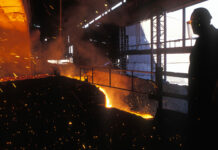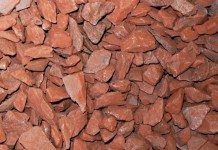
[miningmx.com] — ARCELORMITTAL South Africa (Amsa) is on target to complete the due diligence being carried out on a potential new iron ore mine in the Northern Cape by September.
Amsa CEO Nonkululeko Nyembezi-Heita told investors at a presentation of the group’s interim results to end-June on Wednesday that once the due diligence was completed, further drilling would be carried out and a feasibility study undertaken.
Nyembezi-Heita stressed it was not the group’s strategy to go into iron ore mining on a large scale, but was instead aiming to fill a future gap in iron ore supplies that would occur when the Thabazimbi iron ore mine closed down.
She added she did not want to provide details of the project until the outcome of the due diligence study was known, but commented “this is not another Sishen mine”.
“The project, if viable, could produce 1 million tonnes (mt) to 2mt of iron ore annually which could be pushed to 3mt if it was used as a hub to exploit other smaller deposits in the region which are not viable on their own.’
Nyembezi-Heita added that the development of the mine would also depend on the ability of Transnet Freight Rail to transport the ore to Amsa’s various steelworks.
Amsa needs some 10mt of iron ore annually of which it currently gets 6.5mt from Kumba Iron Ore (Kumba).
The supply contract was cancelled by Kumba last year and Amsa’s future iron ore supply in terms of it will be determined by the outcome of arbitration proceedings over the dispute.
Amsa’s position will also be affected by the court action over ownership of the share of the mineral rights in Sishen that were removed from it by the department of mineral resources.
Kumba is continuing to supply iron ore to Amsa through an interim supply agreement, which will run until the end of July 2012.
SHARES DOWN
Amsa shares dropped 6% to around R69 in early trading on the JSE after releasing a poor set of results for the first half of its financial year and indicating that the current quarter would be worse.
Nyembezi-Heita said third quarter 2011 earnings would show a “substantial decline’ on those of the second quarter just reported.
Reasons included downward pressure on international steel prices compounded by the continued strength of the rand against the dollar; the continued negative impact of higher raw material costs, in particular coal; the planned shutdown of the Saldanha works for 40 days to carry out major repairs and the impact of the wave of strikes on sales.
Amsa reported a 63% drop in attributable earnings to R654m (first half 2010 – R1.8bn) which was caused mainly by soaring costs eating into revenues that remained largely unchanged at R16.6 bn (R16.2bn).
Steel sales dropped 4% during the six months as domestic sales remained flat but exports fell 17% while the cash cost of steel sales per tonne rose by 20% because of the raw material cost increases.
Nyembezi-Heita pointed out that international coking coal prices surged 98% reaching a high of $334/t in January 2011 ($170/t in June 2010) because of the impact of the widespread flooding that affected the main producing mines in Queensland, Australia.
She said the South African domestic coal price index rose 33% in the first half while scrap metal prices were 19% up and electricity tariffs rose 27% after a 24% escalation in 2010.
She added steel producers globally had suffered a structural erosion of their margins because of these cost trends.
Nyembezi-Heita said Amsa’s export programme would be severely affected if the rand were to stick at levels around R6.76/US$1 and international steel prices dropped further.











